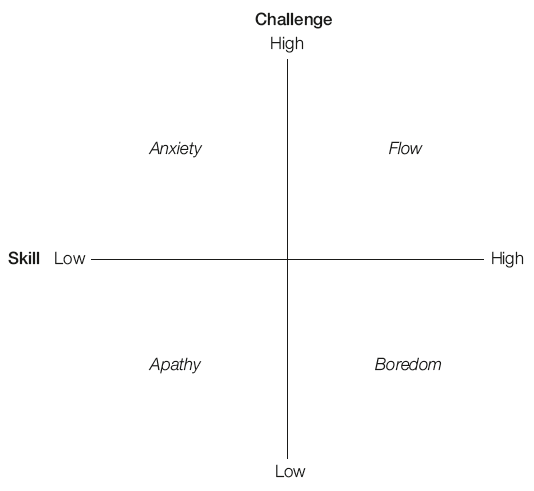CHALLENGE
Everyone loves a challenge. Well, they do if they feel they can meet that challenge. The bigger crisis comes when you don’t feel equipped with the right skills to tackle the challenge.
Hungarian-born Mihaly Csikszentmihalyi has a theory that, if you get two key measures – the levels of challenge and skill – functioning at a high level, you will work in a place called ‘flow’. He describes ‘flow’ as: ‘Being completely involved in an activity for its own sake. The ego falls away. Time flies. Every action, movement, and thought follows inevitably from the previous one . . . Your whole being is involved, and you’re using your skills to the utmost.’
Does that sound like you at work?
Here’s how to show Csikszentmihalyi’s theory of ‘flow’ in diagrammatic form.

In simple terms, if you have a low challenge and low skills to deal with it, then apathy sets in. If you have a high challenge and low skills, then anxiety prevails (remember your first driving lesson?). If you have a low challenge and high skill, then obviously you are going to be bored. The magic quadrant is when you have a high challenge and you also have the high skills – that’s flow!
Flow can often be seen in sports. Tennis players talk of how the game seemed to be slow motion or athletes talk about being ‘in the zone’. Can the same be said for your work?
I believe so. Have you had a time when you were working on a project or had a special task to complete? The hours would fly by because you enjoyed and were totally engaged in what you were doing. Remember that strong sense that you were achieving something? Then you were in flow.
Would you like to experience that again?
Here are some of the key ingredients to get into flow:
- Have a clearly defined goal. It’s almost impossible to get into flow unless you know your outcomes. When a tennis player is in flow it’s because they know they have to win.
- Create an environment for flow. Without the right resources available and a ‘stop-start’ working day you will experience more frustration than flow.
- Support from your ‘sponsor’. This may be your manager, a colleague, customer or other party who is reliant on the results. If you aren’t getting support from these people be proactive and ask them for clear direction and time to discuss your project.
There are some other benefits to flow too. Jim Clifton, CEO of the Gallup Organization, says: ‘People with high flow never miss a day. They never get sick. They never wreck their cars. Their lives just work better.’
Asking for a bigger challenge
One of the main reasons why you won’t have felt challenged is because your boss thinks you are working at your limit. I’m not sure where they pick that up from, but they will continue to think that until you change their thinking. If you want a bigger challenge, don’t wait for them to give it to you – ask!
A note for the self-employed
Remember when you first started your business, you were bright eyed and ready for anything. Then once you ‘got on top’ of things you felt like you were in a comfortable place and you could start to relax. Then your business became a routine.
Here’s a question for you. If you scored low on your level of challenge and you own a business, what would you need to do to double the size of your organisation in the next 12 months? Do you feel challenged now?
Growth = challenge. Staying still effectively means you are going backwards, you’ll lose interest, your staff may get bored and you’ll inadvertently put your business at risk. Go for growth and feel the flow!
BRILL BIT
‘Please, sir, can I have some more?’
When little Oliver Twist asked for some more, he was given a thrashing; when you ask for some more (a greater challenge), you’ll be a hero. Think about it: if you were the boss and a member of your team asked you for a greater challenge how would you feel?
